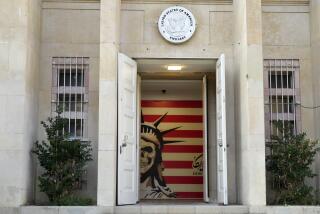Surely Iran Cannot Be Serious : But if it is, there is one easy way to show it
- Share via
Iran, after years of inward-looking revolutionary ferment and intense suffering produced by its eight-year war with Iraq, is now signaling its interest in improving relations with the West and with its Arab neighbors.
The new diplomacy is seen as evidence that President Hashemi Rasfanjani and other pragmatic leaders have outmaneuvered the late Ayatollah Ruhollah Khomeini’s doctrinal heirs, those clerics and other conservatives who bitterly oppose any reconciliation with the West. How should the United States and other countries that have for so long been anathematized by Tehran respond? With interest, certainly, but also with caution. While any trend toward moderation is to be encouraged, the power struggle in Iran is probably not yet over.
The overture to the outside world came at an international oil conference held in Tehran, where Rasfanjani and other senior officials called for a new approach to the West. They specifically linked Iran’s future economic well-being with improved cooperation between oil producers and consumers, and with stable and moderate oil prices. “Cooperation,” said Rasfanjani, Iran’s president since 1989, “should replace confrontation.”
There are, as always, solid practical reasons behind this seeming shift. One is recognition that there has been a sharp falloff in popular support for the anti-Western, rigidly fundamentalist views of the men who battled their way to domination in the post-shah era. Revolutionary zeal today seems to be largely confined to those who were able to gain power, wealth and status as a result of the triumph of the conservatives--mainly mullahs and those who operate the vast machinery of state repression. The mass of Iranians by contrast suffer under spreading poverty, increasing inflation, and a pervasive sense of personal insecurity. Amnesty International reports that more than 5,000 Iranians have been executed in the last three years alone.
Rasfanjani and other pragmatists know that Iran must have substantial foreign loans and joint ventures if its economic skid is to be arrested. They also know that risk-averse lenders and investors will insist on evidence of political stability and greater economic efficiencies. Major Western countries should also insist that any negotiations for loans and investments can only follow the release of all hostages held by Iran’s clients in Lebanon. The United States has always properly made that, along with a halt in Iran’s support for terrorism, conditions for any improvement in its ties with Tehran.
There’s little doubt that Iraq’s defeat at the hands of the U.S.-led coalition earlier this year bolstered the pragmatists in Tehran by showing that the West and the major Arab states were prepared to confront Iran’s major enemy. Now Iran says that it is ready to move toward more normal external relations. Is this professed shift toward a more moderate stance to be believed? Washington repeats that the best earnest of Iran’s intentions will be what it does to resolve the hostage issue. The message is plain. Now the response must be awaited.
More to Read
Sign up for Essential California
The most important California stories and recommendations in your inbox every morning.
You may occasionally receive promotional content from the Los Angeles Times.










